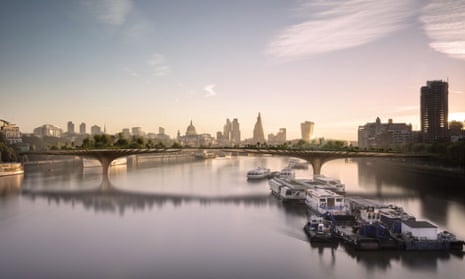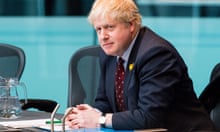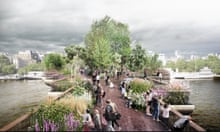The fate of London’s proposed garden bridge has been placed in jeopardy after the city’s mayor, Sadiq Khan, announced a formal inquiry into whether the controversial project is worth the £60m of public money pledged to it.
Dame Margaret Hodge, the Labour MP who spent five years grilling chief executives and senior civil servants as head of parliament’s public accounts committee, will lead a review into the planned £185m structure across the Thames, from Temple to the South Bank.
While Hodge’s inquiry is not explicitly tasked with considering whether the project should be built, it piles further pressure on a troubled and delayed scheme that has yet to raise the private donations needed, or to clear all the necessary planning hurdles.
Unlike the previous mayor, Boris Johnson, Khan is notably more sceptical about the planned bridge, intended to feature 270 trees and thousands of plants, and has promised no more public money will be spent on it.
If Hodge’s report concludes the bridge does not provide value for money – and she is known to be suspicious of expensive public projects in the uncertainty following Brexit – it could potentially be the prompt for Khan to reconsider the scheme.
Hodge’s remit will be to assess the public sector contribution to the project and “whether value for money has been achieved”, as well as to examine the way Transport for London (TfL), the Greater London Authority and other bodies dealt with the proposal.
There has been previous criticism that under Johnson’s mayoralty the project was not properly scrutinised, and that the decision to award the design contact to the studio of the London 2012 Games torch designer Thomas Heatherwick was less than fully transparent.
Supporters argue the bridge will become a landmark, and provide a much-needed pedestrian link in central London. Opponents, however, question the use of such large sums of government money for a privately owned structure in an already thriving part of an economically dominant capital.
Khan said he was adamant the trust would not get a bailout if it hit trouble, and that the project had not shown “the necessary standard of transparency and openness”.

He added: “Nearly £40m of public money has already been spent on the garden bridge project, and Londoners deserve far more information about the decisions that have been made around how their money is being spent.”
Hodge said that while she took no view on the bridge itself, “it is clear that there needs to be far more transparency around how funds are being spent”.
Of the bridge’s total cost, £30m has been given by the Department for Transport and the same amount from TfL, though two-thirds of this latter sum was later made into a long-term loan.
Around £37m of the public money has already been spent by the Garden Bridge Trust, prompting Khan to argue shortly after his election in May that it would cost more to cancel than to proceed.
However, since then there have been more doubts about the project’s viability. In August it emerged that several private donors had pulled out, meaning the trust had to raise more than £50m more of the £115m in necessary private funding, rather than another £30m.
On Monday Joanna Lumley, the actor who came up with the idea of the bridge, said in an interview that the Garden Bridge Trust, on whose board she sits, was struggling to secure a vital consent needed before construction can begin.
The south side of the bridge will be sited on land leased long term to a community housing trust, Coin Street, which must agree to its lease being amended. It had yet to do so, and Lumley told BBC Radio London that Coin Street’s leaders seemed “very opposed” to the project.
Coin Street denies this, but has set a series of conditions on any deal, which the Garden Bridge Trust is struggling to meet. One source familiar with the talks said there had been no discussions for several months, and that Coin Street had worries about the trust’s ability to deliver the project.
A Garden Bridge Trust spokeswoman said Lumley had been mistaken in thinking that Coin Street opposed the project, but agreed that time was pressing: “We’ve been talking to Coin Street for three years now, and they still haven’t agreed a deal with us. Things are becoming quite urgent and it would be nice to make some progress with them.”
Initial construction on the bridge was due to have started earlier this year, but will now not begin until 2017 at the earliest, obliging the trust to agree a new timetable with contractors.










Comments (…)
Sign in or create your Guardian account to join the discussion